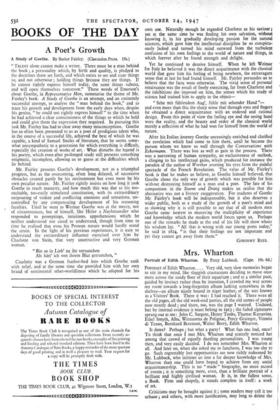BOOKS OF THE DAY
A Poet's Growth
A Study of Goethe. By Barker Fairley. (Clarendon Press. 15s.)
" TALENT alone cannot make a writer. There must be a man behind the book ; a personality which, by birth and quality, is pledged to the doctrines there set forth, and which exists to see and state things so, and not otherwise ; holding things because they are things. If he cannot rightly express himself today, the same things subsist, and will open themselves tomorrow." These words of Emerson's about Goethe, in Representative Men, summarise the theme of Mr. Fairley's book. A Study of Goethe is an attempt, and an eminently successful attempt, to analyse the " man behind the book," and to trace his growth and development from the early days when, despite his genius, " he could not rightly express himself " to the time when he had achieved a clear consciousness of the things to which he held and could give them the expression they required. In pursuing this task Mr. Fairley has had to clear away many misconceptions. Goethe has so often been presented to us as a poet of prodigious talent who, in the course of a successful life, achieved the best of which he was capable, a kind of Samuel Smiles of literature, that he seems some- what unsympathetic to a generation for which everything is difficult, especially the creation of works of art.. What disturbs the legend is his poetry, which even after prolonged study still presents something enigmatic, incomplete, allowing us to guess at the difficulties which lie behind.
Mr. Fairley presents Goethe's development, not as a triumphal progress, but as the overcoming, often long delayed, of successive obstacles created partly by his environment but even more by his own peculiar nature. Mr. Fairley rightly insists on how long it took Goethe to reach maturity, and how much this was due to his too- excitable, too-easily stimulated constitution, with its extraordinary outpouring of violent and conflicting emotions and sensations, un- controlled by any compensating development of his reasoning faculties. Until he went to Weimar Goethe was at the mercy, not of circumstances, but of himself, like' Hitler a Nachtwandler who responded to promptings, intuitions, apprehensions which he neither understood nor cared to understand, though from time to time he realised that even his Protean nature would hardly stand the strain. In the light of his previous experiences, it is easy to understand the extraordinary influence exercised over him by Charlotte von Stein, that very unattractive and very German woman.
" Bin so in Lieb' zu ihr versuncken Als hate ich von ihrem Blut getruncken. "
Charlotte was a German feather-bed into which Goethe sank with relief, and at the same time she provided him with her own brand of sentimental other-worldliness which he adapted for his own use. Naturally enough he regarded Charlotte as his saviour ; yet at the same time he was finding his own salvation, without knowing it, in his gradually developing passion for the natural sciences, which gave him the intellectual discipline he so conspicu- ously lacked and turned his mind outward from the turbulent confusion of his own feelings to the world of nature and things, in which forever after he found strength and delight.
Yet he continued to deceive himself. When he left Weimar for Italy he believed it was the direct acquaintance with the classical world that gave him his feeling of being newborn, the extravagant sense that at last he had found himself. Mr. Fairley persuades us to believe that the facts were otherwise. The vivid sense of personal renaissance was the result of freely exercising, far from Charlotte and the inhibitions she imposed on him, the senses which his study of science had trained him to apply to the object- " Sehe mit fuhlendem Aug', fuhle mit sehender Hand "- and even more than this the sharp sense thae through eyes and fingers he obtained a direct acquaintance with an ordered and rational design. From this point of view the feeling eye and the seeing hand were the reality, and the beauty and order of the classical world merely a reflection of what he had won for himself from •the world of nature.
After his Italian journey Goethe unceasingly enriched and clarified the revelation which had come to him there, until he became the person whom we know so well through the Conversations with Eckersnann. There was loss as well as gain in the process. There was a narrowing of human sympathy, an exclusiveness of outlook, a clinging to his intellectual gains, which produced for instance the paradox of the author of Werther averting his eyes from the painful spectacle of the French Revolution. The value of Mr. Fairley's book is that he makes us believe, as Goethe himself believed, that Goethe chose the only way of growth which was possible for him without destroying himself as a man and a poet. The fate of his companions in the Sturm and Drang makes us realise that the alternative was not a literary exaggeration. For students of Goethe Mr. Fairley's book will be indispensable, but it also deserves a wider public, both as a study of the growth of a poet's mind and as showing why it is still possible to say that of all modern men Goethe came nearest to mastering the multiplicity of experience and knowledge which the modem world forces upon us. Perhaps one of the remarks he made at the end of his life will show where his wisdom lay. " All that is wrong with our young poets today," he said in 1824, " is that their feelings are not important and yet they cannot get away from them."
GORONWY REES.
































 Previous page
Previous page